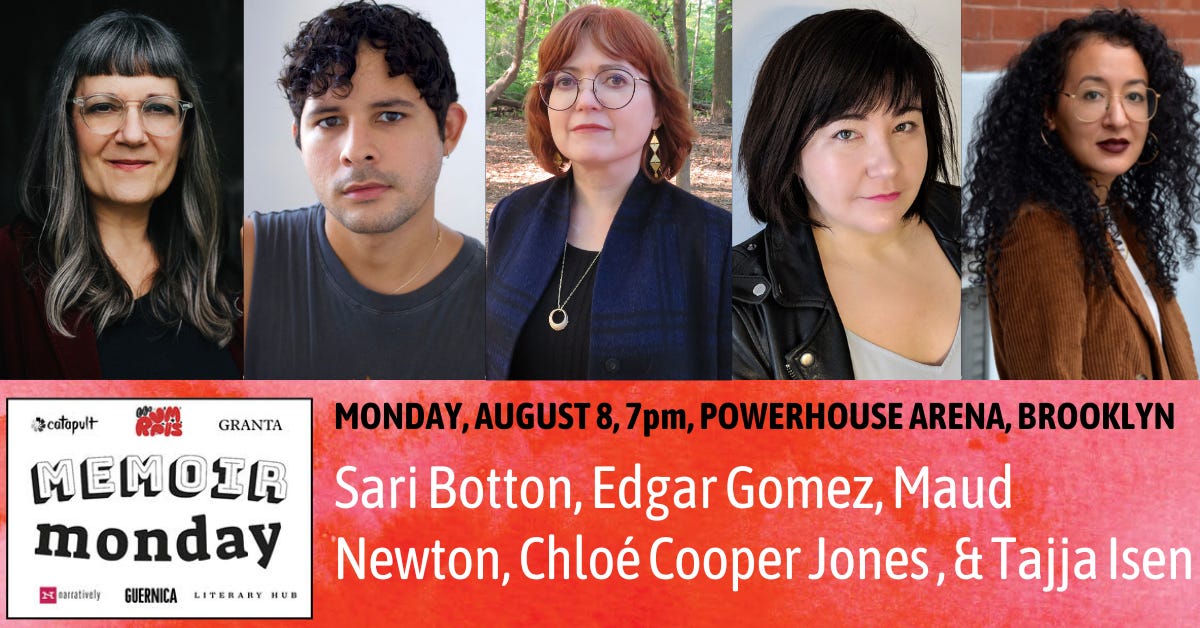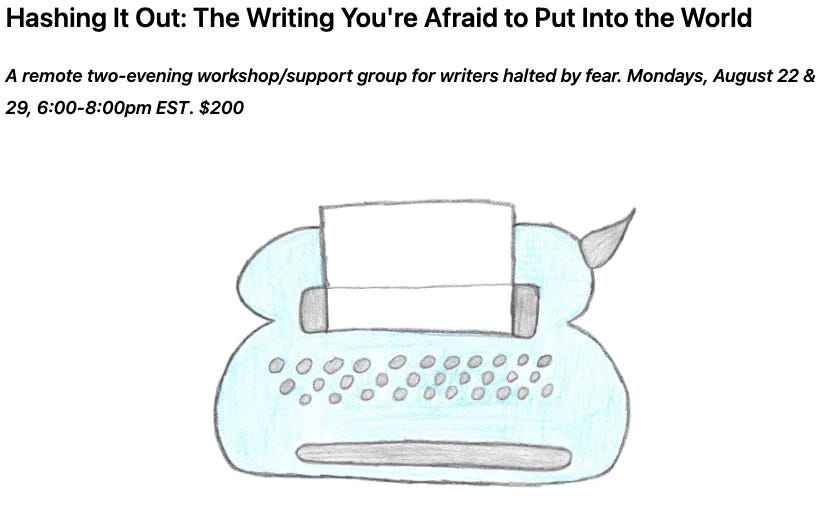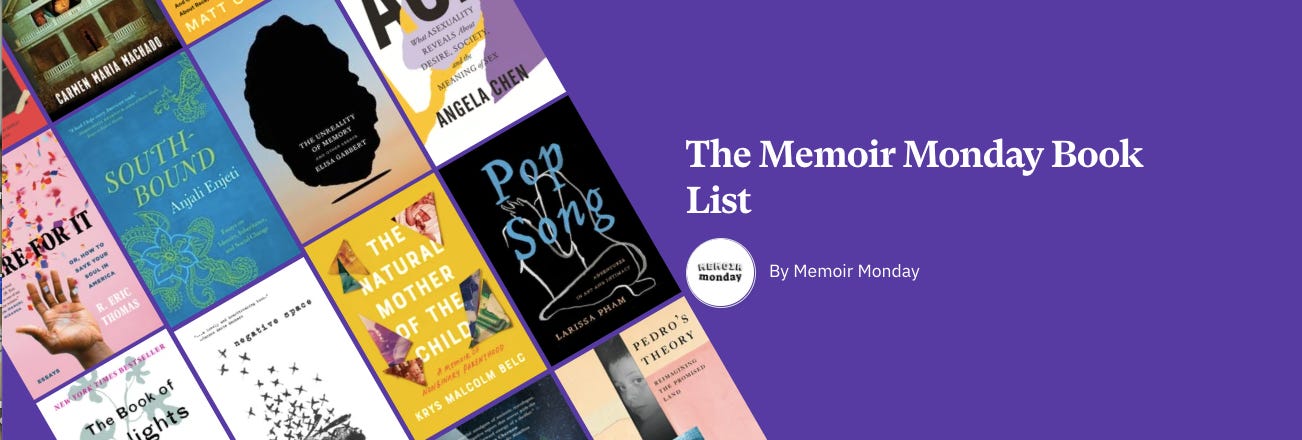Hot Off the Presses, A Dozen New Personal Essays...
Plus: Tonight's Memoir Monday reading in Brooklyn, and some workshops...
Welcome to Memoir Monday—a weekly newsletter and a quarterly reading series, brought to you by Narratively, The Rumpus, Catapult, Granta, Guernica, Oldster Magazine, Literary Hub — and now many additional publications.
In addition to the weekly curation, there are now original personal essays under the heading of First Person Singular, for paying subscribers.
The sixth original essay, published in First Person Singular in late July, is “Strange Heirloom,” by Elizabeth Roper Marcus. The seventh original essay is coming later this month. Submissions are open. You can find submissions guidelines and more on the “About” page.

Essays from partner publications…
The Lucky Ones
by Jill Christman
“Context is everything, and God is in the details. I live my life through the twin tenets of curiosity and close observation. I believe imagination and storytelling are central to our survival as a species—and yet, it’s my imagination that makes me jumpy.”
With Matrilineage as a Map
by Eman Quotah
“I understand the scarcity of written histories. I was born the same year as fictional Sara (1971) on the other side of the Arabian Peninsula, in Jeddah, Saudi Arabia; my father and grandparents had no birth certificates to tell us when they were born. I know how difficult and how essential it is to wrap our arms around the stories of the people who came before us, especially the women.”
In Old Spaces, New Awakenings
by Blake Pfeil
“Every weekend, I ventured out to a new location, each one much different than the last: military bases, factories, churches, bowling alleys, resorts, motels, psychiatric facilities, movie theaters, and houses. What started as a way to safely pass the time evolved into a salve for my mental health and a realm for my creativity to explode.”
Sings of an Approaching
by Volodymyr Rafeyenko
“One small and nameless bird flitted along the road, chasing a huge raven. The raven seemed impossibly large, it flew low over the tarmac, and the little bird, no bigger than my fist, swooped down and attacked it with cries. The raven fled in disgrace and we were sorry not to have identified its little pursuer. I remember, too, a large group of storks. Over a dozen of them, they took up such a space in the sky. They were not in any kind of formation or flock, but at the same time they were clearly together; not just gliding in the insane blueness of the sky, but travelling in an extraordinary, harmonious trajectory, a dance-flight. The sight of them made me want to weep.”
The Pain-Writing-Money Trifecta: On Nora Ephron and Grief as Copy
by Ella Risbridger
“The day we told people that my fiancé died—his name was John, and he was 28—we sat in the hot little kitchen of my friend’s flat above the street market reading the nice things people had said. A lot of people had said nice things; John had known a lot of people, and also he was a journalist, and funny, which meant a lot of people were sad about his death whom he had never known. ... He was incredibly funny about dying, and he wrote very funny things about dying very young. Also, like me, he wrote about himself. We had both written about him dying for money; we had tried to make art out of something terrible, we had tried to, as it were, go full Ephron. Everything, after all, is copy.”
What Lullabies Teach Us About Language
by Kristin Wong
“My mom says the reason we don’t talk about these things is cultural. She says that Chinese people don’t talk about memories because talking about the past is almost like inviting it to come back and haunt you. Over the years, she’s shared stories of our family’s history—sagas of loss and hardship—but I keep coming back to that simple memory of the first song we sang together. Lullabies have been called a “cultural memory transmitter,” a way of keeping histories alive through songs passed on to children. A way of talking about the past without really talking about the past.”
Essays from around the web…
Why Write?
by Elisa Gabbert
“I’ve been collecting these theories of why writers write because so many writers have written about it. I love reading writers on writing. I love writers on their bullshit. During the first year of the pandemic, I started listening obsessively to interview podcasts. At first this was strategic. I had a book coming out, and I thought of them as training; I thought they would help me get better at talking about my own book. But I was also lonely. I wasn’t going to readings or parties, and I missed writers’ voices.”
Sex After Death
by Beth Alvarado
“After my husband, Fernando, had been dead for about two years, I decided to fill out a profile on Match.com. Of course, on that particular evening, I'd drunk quite a bit of wine. You had to answer a bunch of questions. You had to upload a photo of yourself. You had to come up with a password. I took another sip of wine and typed, 'Dumbass,' thinking I was creating a password. I didn't realize this would be my screen name.”
Photorealism
by Kate Neuman
“What strikes me the most about these pictures is my parents' obvious and great pleasure in each other’s company. It’s almost shocking. When I knew them, they were the kind of couple that provokes friends to wonder why, as if it were surprising that they would know each other as more than acquaintances, that their relationship had ever gone further than a polite “excuse me,” as one of them mistakenly jostled the other in line at a movie.”
What Narendra Modi Is Taking From Me
by Anandi Mishra
“So it was in Delhi. To live in the city was to walk it. I would stroll alongside white-collar commuters, daily-wage laborers, students, all of us submerged in the mundanity of our everydays. History was all around me, and everything lent itself to meaning. The tree-lined roads radiating the central vista, which converged in hexagonal nodes, gave me a sense of pride I could never quite place. The boulevards dotted with white bungalows—some pristine, others dilapidated—that had colonnaded verandas and spacious gardens made the area feel like not just a relic from a colonial past but a special part of our present too.”
Get Out There Like Gaga
by Jason Prokowiew
“Before this year, I’d submitted my writing sporadically; each rejection knocked me off my game. By not submitting, I kept myself safe from the feeling of rejection…and also kept myself pretty safely removed from getting published.”
The Rooms in Which I Waited
By Debbie Urbanski
“In my first dream about my second surgery, I was in a waiting room. Surprise, surprise. I was in a waiting room on a children's floor decorated with the universe. I explained to my mom I can't recover on a floor of children. As proof I motioned to my breasts which were still there at the time under the hospital gown. My dream mom shrugged: what could she have done. The dream nurse read me a picture book about dreaming bears. There were kleenex boxes on all the available surfaces. I am talking about the real world again, I forgot to mention. There were waiting rooms within waiting rooms.”
🚨Announcements:
This is tonight, Monday, August 8th at 7pm EST in Brooklyn!
Tonight, the quarterly Memoir Monday Reading Series, hosted by, Memoir Monday founder Lilly Dancyger, returns to Powerhouse Arena in Brooklyn, featuring Edgar Gomez, Maud Newton, Chloeé Cooper Jones, Tajja Isen, and Sari Botton. RSVP…

Memoir Monday founder Lilly Dancyger is offering an essay revision workshop you won’t want to miss!
I (Sari Botton) am also leading a workshop you might like. ..
📢 Attention Publications and writers interested in having published essays considered for inclusion in our weekly curation:
By Thursday of each week, please send to memoirmonday@gmail.com:
The title of the essay and a link to it.
The name of the author, and the author’s Twitter handle.
A paragraph or a few lines from the piece that will most entice readers.
Because of data limits for many email platforms, going forward we will only include artwork from our partner publications. No need to send art.
*Please be advised, however, that we cannot accept all submissions, nor respond to the overwhelming number of emails received. Also, please note that we don’t accept author submissions from our partner publications.
Memoir Monday is a reader-supported publication that pays contributors to its First Person Singular series of original essays. To support this work, become a paid subscriber.
You can also support Memoir Monday—and indie bookstores!—by browsing this Bookshop.org list of every book that’s been featured at the Memoir Monday reading series. It’s a great place to find some new titles to add to your TBR list!
If you received this email from a friend or found it on social media, sign up below to get Memoir Monday in your inbox every week!






